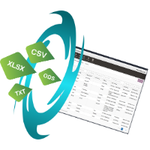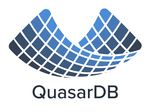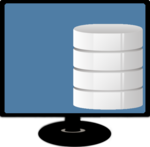What Is Database Management System?
Software known as a database management system (DBMS) enables users to efficiently and securely store, arrange, and retrieve data. Because it streamlines data administration and improves decision-making, it is a vital tool for companies of all sizes. By offering an intuitive interface for maintaining and querying data, a DBMS serves as a link between the user and the database.
Eliminating the need for human data handling, which may be laborious and prone to errors, is one of the primary benefits of a database management system. Users can define, modify, and query data with a DBMS without worrying about the underlying data structures. This lowers the possibility of human error and facilitates data administration. The market offers a variety of database management system (DBMS) types, such as relational, hierarchical, and object-oriented.
Every type has advantages and disadvantages of its own, therefore the decision should be made in light of the particular demands and specifications of the company. The capacity of a DBMS to guarantee data security and integrity is one of its primary characteristics. It permits numerous users to access the same data without jeopardizing its accuracy. Businesses can guarantee that only authorized workers can access data by implementing appropriate access control measures.
This is essential for protecting sensitive data's privacy and confidentiality. Additionally, a DBMS provides backup and data recovery features to make sure that data is not lost as a result of unanticipated circumstances like system failures or power outages. For companies that handle a lot of important data, this capability is crucial. Scalability, interoperability, and cost are critical considerations when choosing a database management system (DBMS) for your company.
As a business expands and changes, a DBMS should be able to adjust to meet its evolving needs. Additionally, it ought to work with the current software and hardware setup. To make sure it fits inside their budget, organizations also need to account for the cost of implementation, upkeep, and upgrades.
What Are The Recent Trends In Database Management System?
A vital tool for managing and retrieving vast volumes of data is a database management system (DBMS). As technology has advanced, database management systems (DBMS) have also changed in recent years to meet the ever-increasing demands of data management. To make an informed choice as a prospective customer, it is critical to comprehend the most recent developments in database management systems. You should be aware of the following major DBMS trends:
1. Cloud-Based DBMS: The shift to cloud-based solutions is one of the main DBMS trends. Database systems are moving to the cloud in tandem with cloud computing's growing popularity. More cost-effectiveness, scalability, and flexibility are made possible by this.
2. Big Data Integration: As big data becomes more popular, database management systems are changing to handle different and huge information. These days, a lot of database management systems come with built-in tools and features for managing large data, like parallel queries and distributed processing.
3. Real-Time Data Processing: Businesses must make judgments quickly in the fast-paced world of today. Because of this, database management systems (DBMS) that can process data in real time have emerged, enabling businesses to make quick and precise decisions.
4. Integration With AI And Machine Learning: In order to enable more automated and intelligent data management, database management systems (DBMS) are now integrating AI and ML capabilities. DBMS can analyze data, spot trends, and forecast outcomes because to this integration.
5. Security And Privacy: DBMS companies are giving security and privacy top priority in their products because to the rise in data breaches and privacy issues. To safeguard sensitive data, DBMSs today come equipped with sophisticated security features including encryption, access control, and monitoring.
6. Mobile And IoT Compatibility: As mobile technology and the internet of things (IoT) grow in popularity, DBMSs that can manage data from multiple sources, such as mobile devices and sensors, are becoming more and more necessary. Newer DBMS that can easily manage a variety of data sources have been developed as a result of this trend.
7. Open-Source DBMS: Because of their affordability and adaptability, open-source DBMS, such MySQL, PostgreSQL, and MongoDB, are becoming more and more well-liked. They are a desirable choice for businesses of all sizes since they provide a competitive substitute for conventional, proprietary DBMS.
Benefits Of Using Database Management System
Strong software tools called database management systems (DBMS) assist companies and organizations in effectively managing, organizing, storing, and retrieving vast volumes of data. Businesses need to install a DBMS in order to stay competitive and make educated decisions, given the ever-increasing volume and complexity of data in today's digital environment. The main advantages of utilizing a DBMS and the reasons it is an essential investment for every company will be covered in this buyer's guide.
1. Better Data Management: Efficient data management is a DBMS's main goal. Spreadsheets and numerous systems are no longer necessary thanks to its integrated platform for data organization and storage. Because DBMS guarantees data correctness and consistency, organizations may base their judgments on trustworthy information.
2. Time And Cost-Efficient: Updating and managing data by hand can be costly and time-consuming. Processes are automated with a DBMS, which saves money on labor and time. Additionally, it eliminates the requirement for physical storage space, which lowers the overhead expenses related to keeping physical documents.
3. Improved Data Security: Information is an important resource for every business, and it is essential to safeguard it against unwanted access. To guarantee the confidentiality and integrity of data, database management systems (DBMS) provide sophisticated security features including encryption, access limits, and user authentication. Additionally, it makes data recovery and backups simple in the event of a disaster or system failure.
4. Enhanced Productivity: By enabling staff to swiftly access the necessary data, a database management system (DBMS) raises overall productivity. Because everyone gets real-time access to the same information, it also facilitates effective teamwork. This increases data accuracy and does away with the necessity for duplicate data entering.
5. Scalability And Flexibility: A DBMS can readily grow to meet the demands of expanding enterprises and their growing data requirements. Additionally, it permits new apps to be integrated without interfering with the current system. DBMS is a long-term option for data management because of its scalability and versatility.
6. Improved Decision Making: DBMS offers reporting and data analysis capabilities that let companies learn more about their data. Businesses can swiftly evaluate large volumes of data, spot trends, and make data-driven choices with the help of configurable dashboards. Better performance and a competitive advantage result from this.
Important Factors To Consider While Purchasing Database Management System?
Every buyer should take into account a few crucial criteria when investing in a Database Management System (DBMS). For companies of all sizes, a database management system (DBMS) is an essential tool for effectively managing massive amounts of data. As a result, selecting the appropriate DBMS that satisfies the unique demands and specifications of your company is crucial. We will go over the crucial elements to take into account while buying a DBMS in this buyer's guide.
1. Scalability: The DBMS's scalability should be taken into account first and foremost. Your needs for managing and storing data will develop along with your company. Selecting a database management system (DBMS) that can manage your present data requirements and develop with your company in the future is therefore essential.
2. Performance: One important factor to take into account is a DBMS's performance. Large volumes of data may be processed rapidly by a well-performing DBMS, which also guarantees seamless data retrieval and manipulation. Selecting a database management system (DBMS) that provides fast, effective data retrieval and little downtime is essential.
3. Data Security: For any firm, data security is of utmost importance. To protect the data of your business, it is crucial to check for features like encryption, access control, and data backups when buying a DBMS.
4. Integration Capabilities: Your current software and systems should be able to easily integrate with the DBMS you select. This will make it simple for systems to share and exchange data, which will increase efficiency and productivity.
5. User-Friendly Interface: Effective data management requires an interface that is easy to use. Choose a database management system (DBMS) that has an easy-to-use interface that your staff can utilize without any training.
6. Support And Maintenance: A DBMS may need routine maintenance and support, just like any other software. Before making a purchase, it is critical to verify the degree of technical support and maintenance provided by the DBMS vendor.
7. Cost: When buying any software, budget is an important consideration. Depending on the features and capabilities provided, DBMS costs might vary greatly. As a result, it's critical to assess your spending and select a database management system that provides the most value.
8. Database Type: Relational, non-relational, and cloud databases are among the different kinds of databases that are available. Selecting the best database type for your company's needs requires an understanding of your data and its requirements.
9. Flexibility And customization: Every company has different needs, and their DBMS may require customization features. In order to satisfy your unique requirements, it is essential to take into account the degree of customization and flexibility provided by the DBMS.
10. Future Roadmap: It's critical to monitor the DBMS provider's future plan. This will ensure that your DBMS remains current and relevant by giving you a sense of the new features and updates that will be available in the future.
What Are The Key Features To Look For In Database Management System?
Businesses and organizations that need to store, manage, and analyze significant volumes of data must have a database management system (DBMS). It might be difficult for customers to choose the DBMS that best suits their needs because there are so many alternatives on the market. Here are the essential characteristics to search for in a DBMS to aid in the decision-making process:
1. Data Storage And Retrieval: Efficient data storage and retrieval is a DBMS's main purpose. Seek out a system with strong data storage features, including the capacity to manage large volumes of data, a variety of data kinds, and intricate linkages between data tables.
2. Data Security: Selecting a DBMS with sophisticated data security capabilities is essential given the increase in cyberthreats. To guarantee that your data is always safe, they could include audit trails, access limits, and data encryption.
3. Scalability: As your company expands, so will your data requirements. Selecting a database management system (DBMS) that can grow with your expanding data needs for example, by adding more storage and processing capacity without affecting performance—is essential.
4. Multitenancy: Choose a database management system (DBMS) that supports multitenancy if your company needs to handle several databases for various clients or departments. Each tenant can have user access control and secure data separation thanks to this functionality.
5. Integration And Compatibility: Your DBMS needs to work with the apps and systems you currently have. To facilitate integration with other applications and tools, look for a system that supports industry-standard data structures and languages.
6. Backup And Recovery: A DBMS's backup and recovery capabilities are essential since mishaps and hardware malfunctions can cause data loss. Automated backups, point-in-time recovery, and disaster recovery options are features to search for.
Reporting And Analytics: To enable users to learn from their data, a good database management system (DBMS) should have strong reporting and analytics features. Seek out systems with sophisticated querying features, data visualization tools, and dashboards that can be customized.
8. User-Friendly Interface: For non-technical users in particular, an interface that is easy to use and intuitive is crucial. To make data administration activities more accessible and effective, look for a database management system (DBMS) with a contemporary and user-friendly interface.
9. Customer Service And Training: Selecting a database management system (DBMS) from a trustworthy vendor that provides dependable customer service and training is crucial, just as with any other program. To help you get the most out of the DBMS, look for a provider that offers comprehensive documentation, training materials, and technical support. When investing in a database management system that fits the unique requirements and objectives of your company, you can make an informed choice by taking into account these important aspects. Selecting a database management system (DBMS) that meets your current and future data management requirements requires a thorough evaluation of your requirements.
Why Do Businesses Need Database Management System?
For any company that handles a lot of data, a database management system (DBMS) is a necessary tool. A database management system (DBMS) is a piece of software that makes it possible to create, manage, and work with databases. It is essential for companies of all sizes and sectors since it offers a consolidated platform for data management, storage, and retrieval.
Effective data management is one of the primary reasons why companies use a DBMS. In the current digital era, the amount of data is constantly increasing, making manual management all but impossible. Businesses can arrange their data in a systematic way with a DBMS, which facilitates access and analysis. As a result, decision-makers can use accurate and current information to make prompt, well-informed judgments.
A DBMS also guarantees data security and integrity. The accuracy and consistency of data are referred to as data integrity in a business context. Errors, inconsistencies, and duplicate data might result from letting several people view and edit data at once. By putting strong rules and controls in place, a DBMS avoids these problems and preserves the integrity of the data.
Another crucial issue that a DBMS handles is security. Companies handle private and sensitive data, including employee information, financial records, and client information. The privacy and confidentiality of important data are guaranteed by the built-in security measures of a database management system (DBMS), which shield this data from unwanted access. Enhancing data sharing and cooperation inside an organization is one of a DBMS's many noteworthy benefits.
Multiple departments and users can access the same database with a DBMS, which improves data consistency and removes the need for data duplication. This encourages improved teamwork and communication, which raises operational productivity and efficiency. Furthermore, a DBMS enables businesses to handle a variety of data types, including text, images, audio, and video.
Because of this, it's a good option for companies that need to handle and store different kinds of data. Furthermore, a DBMS is scalable as a company expands due to its ability to manage enormous volumes of data. In conclusion, a DBMS is a fundamental tool for businesses to manage their data effectively, maintain data integrity and security, promote data sharing and collaboration, and handle varying data types and volumes. A DBMS is an investment that can have a big impact on a company's success and expansion because of its many advantages.
How Much Time Is Required To Implement Database Management System?
The size and complexity of your database, the type of database management system (DBMS) you choose, and the experience of the team installing it are some of the variables that might affect how long it takes to implement a DBMS. Implementing a database management system (DBMS) can take a few weeks to several months on average. Selecting the best database management system (DBMS) for your needs is the first step in putting it into practice.
This entails assessing the amount of technological know-how available, your budget, and your data requirements. A strong and feature-rich DBMS might be required for larger and more sophisticated databases, whereas a lightweight and user-friendly DBMS might be adequate for simpler databases. Making a database design is the next step after deciding on a DBMS.
This entails charting the arrangement and connections among the data components. For effective information retrieval and seamless data management, a well-designed database is essential. After that, the database can be set up, the required tables can be created, and the data can be imported to start the implementation process. This procedure can take a long time, particularly for big databases that include a lot of data.
The DBMS must be customized and tuned for maximum performance following database setup. This entails configuring user access levels, security mechanisms, and indexes to enhance query speed. Testing the DBMS to make sure it is operating properly and satisfies all requirements is the last stage. Before the system can go live, any faults or errors must be found and repaired, which may take some time.
What Is The Level Of Customization Available In Database Management System?
Numerous customization choices are available with Database Management Systems (DBMS) to satisfy the unique requirements of companies and organizations. Because of these adaptable capabilities, users can customize the DBMS to meet their own needs, making it an effective tool for data management and analysis. The kind of implementation—on-premises, cloud-based, or hybrid—is one of the most important considerations when examining the degree of customisation that a DBMS offers.
Because on-premises DBMSs are deployed and managed on the user's own servers, they usually offer a high degree of customisation. This gives users total control over the data, software, and hardware, enabling them to alter every feature of the DBMS. However, because cloud-based DBMSs are maintained and controlled by the provider, they could not offer as many customization choices.
Nonetheless, a wide range of customisable features, including user permissions, data storage options, and reporting capabilities, are available in many cloud-based DBMS. Data structures, user interfaces, and data security are some important customisation features to consider while assessing a database management system. Users can specify the structure and format of their data with a DBMS that supports customized data structures, which facilitates management and analysis.
Businesses can create a more smooth and user-friendly experience by customizing the DBMS to their branding and design preferences with customizable user interfaces. Another essential component of customisation is data security, which enables users to establish access levels and permissions for various people or groups, protecting critical information.
Many DBMSs provide sophisticated functionality like data migration, system integration, and the capacity to generate unique reports and dashboards in addition to these fundamental customisation choices. These features enable companies to optimize their workflows and satisfy their unique data management requirements.
Although customisation options can significantly increase a database management system's flexibility and functionality, it's crucial to remember that they also take a lot of time and money to implement and maintain. In order to prevent needless expenses and complexity, it is crucial to thoroughly evaluate the degree of customization required before choosing a DBMS.
Which Industries Can Benefit The Most From Database Management System?
For businesses to effectively store, manage, and retrieve data, database management systems, or DBMS, are crucial tools. In today's digital world, where data is generated and transmitted at an ever-increasing rate, database management systems (DBMS) have become essential for companies in a variety of industries. Let's examine which sectors stand to gain the most from DBMS implementation.
1. Healthcare Sector: The healthcare sector handles a great deal of private patient data, such as insurance details, treatment plans, and medical records. For handling and storing this data, DBMS can offer a dependable and safe platform that guarantees appropriate organization and simple access. Additionally, by making correct and current data easily accessible, DBMS can assist healthcare facilities in improving patient care and streamlining their administrative procedures.
2. Banking And Financial Industry: Security and data integrity are essential in the banking and financial industry since it handles extremely sensitive financial data. DBMS can be quite helpful in guaranteeing the confidentiality, availability, and correctness of financial data. DBMS is a useful tool for this sector since it enables the effective handling of transactions, client data, and loan administration.
3. Retail Industry: Understanding consumer behavior, tastes, and purchase trends in the retail sector depends heavily on customer data. Retailers can obtain important insights into consumer behavior by using DBMS to gather and examine enormous volumes of data from multiple sources, including internet purchases and point-of-sale systems. The consumer experience can then be enhanced and marketing strategies can be tailored with this information.
4. Education Sector: Database management systems (DBMS) can assist educational institutions in managing student data, course materials, and academic records. It also facilitates effective communication between administration, professors, and students and aids in monitoring their development. Educational institutions can increase overall efficiency, decrease paperwork, and streamline administrative procedures with DBMS.
5. Government Agencies: These organizations handle vast amounts of data, such as census data, tax data, and citizen records. These organizations may safely and effectively store, manage, and analyze this data with the use of DBMS. Because it offers real-time insights into trends and patterns, it also facilitates improved decision-making.
Conclusion
It is reasonable to conclude that selecting the best database management system (DBMS) is essential to any company's success after careful investigation and analysis. In addition to serving as a storage tool, a database management system (DBMS) helps manage and organize massive volumes of data, ensures data security and integrity, and boosts productivity. The key elements to take into account while buying a DBMS have been discussed in this buyer's guide.
These include identifying your company's requirements, comprehending the various DBMS kinds, examining the system's scalability and adaptability, taking backup and security measures into account, and figuring out how much it will cost and what support services are offered. You may choose a database management system (DBMS) for your company with knowledge if you adhere to these recommendations.
Remember that every company has different needs, so it's important to thoroughly consider every factor to make sure the DBMS you choose can successfully satisfy your goals. Furthermore, when selecting a DBMS, consider how your company will grow and expand in the future. It should be able to adjust to new technologies and meet the growing demands for data.
In conclusion, any company that wants to remain competitive and relevant in the fast-paced digital world of today needs a strong database management system. We hope that this buyer's guide has given you the knowledge you need to help you make the best choice for your company's long-term success. So, bear these ideas in mind and enjoy your DBMS search!






















